With fuel prices still trending higher than in previous years, many drivers are looking for ways to optimize fuel efficiency. The good news is that you can get more fuel economy from your car simply by changing your driving habits. Focus on maintaining steady speeds, accelerating smoothly, and avoiding hard stops.
Reduce Your Speed
Staying within the posted speed limit is one of the easiest ways to improve your fuel economy. The faster you drive, the more fuel you burn. It’s also important to maintain a steady speed and use cruise control when appropriate. Accelerating and braking constantly reduces your fuel economy. When you start from a stop, accelerate slowly and smoothly to minimize fuel usage. On the other hand, when you’re approaching a stop, anticipate it by slowing down to avoid hard braking.
Maintain Your Tire Air Pressure

Underinflated tires produce higher rolling resistance on the road, which means your engine has to work harder to push them. The extra friction reduces fuel efficiency by quite a bit. For example, if all your tires are underinflated by 10 psi, it can reduce your fuel economy by as much as 10%. It’s important to check your tires regularly for damage and signs of wear. Even if you don’t have a leak, your tires can naturally lose up to 3 psi per month. A few months of not checking them could lead to low air pressure.
Use Your AC

In hot weather, you might be worried about burning fuel by using your AC and instead roll the windows down. However, driving with your windows down at freeway speeds causes strong wind resistance and makes your car less aerodynamic. This resistance means your car is burning more fuel. In this situation, it’s much more fuel-efficient to put your windows up and turn your AC on.
Engage in Predictive Driving
With all the technology in cars now, it’s easy to get distracted and not focus 100% on the road around you. However, practicing predictive driving can really help your fuel economy. Keep an eye on the traffic and road ahead to anticipate slowdowns. Instead of having to slam on your brakes when approaching a stop, you can slow down well in advance and use your brakes to come to a full stop. When you get to a hill, slowly accelerate in advance rather than hitting the gas hard as you go up it.
Plan For Rush Hour

Rush hour is probably one of the worst situations for good fuel economy. Stop-and-go traffic puts a lot of pressure on your engine and forces you to stay in lower gear. If you can, plan your commute to avoid high-traffic areas. Even if you travel a longer distance at normal speeds, it’s better than stop and go. Similarly, idling too long burns fuel when you’re not moving. If you’re idling for more than three minutes, you can save fuel by turning off your engine and then restarting it when it’s time to move.
Other ways to improve your fuel economy include not carrying a lot of weight in your trunk and ensuring that your car is up to date on maintenance.

